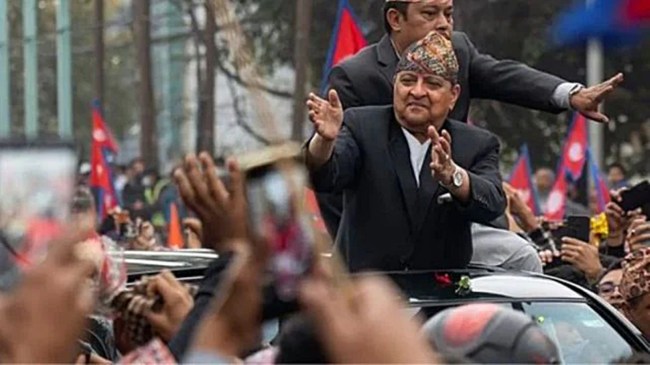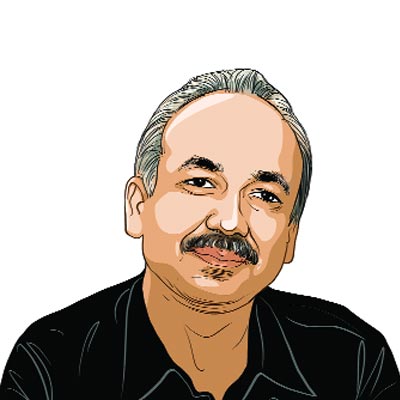Opinion Why many in Nepal want a return of the king
Police crackdown on protesters has made Prime Minister K P Sharma Oli more unpopular. He has sought to place the entire blame on former King Gyanendra Shah, but the tables might turn on him.
 PM Oli has sought to place the entire blame on former King Gyanendra Shah (above), but the tables might turn on him. (AP/ PTI Photo)
PM Oli has sought to place the entire blame on former King Gyanendra Shah (above), but the tables might turn on him. (AP/ PTI Photo) Nepal’s current regime, ironically backed by all the pro-democracy parties, has turned to coercion to suppress a movement that seeks to restore the constitutional monarchy abolished 17 years ago. In a protest rally that lasted less than five hours on March 28, the brutal repression by the police force – 58 rounds of bullets and 746 rounds of tear gas shells fired — has left at least two people dead and 20 wounded. The action has made Prime Minister K P Sharma Oli more unpopular. He has sought to place the entire blame on former King Gyanendra Shah, but the tables might turn on him.
At least half-a-dozen retired police leaders have separately condemned this act as “very un-police-like” and hinted at an even greater controversy. A couple of days prior to the scheduled rally, Oli had called upon the Yuba Sangh volunteers – a militant group of youths affiliated to the Communist Party of Nepal (Unified Marxist Leninist) — to attack the monarchists. The Yuba Sangh was on the streets along with the protesters, and suspicions were raised about police complicity vis-a-vis the outfit.
Oli used the parliament’s privileged four walls to denounce the former king, threatening him with dire action. Little did he realise that the general public was not happy with his perceived pursuit of vendetta politics, abusing state authority and criminalising dissent. Almost all the top leaders of the Rastriya Prajatantra Party — which is at the centre of the movement for the restoration of the monarchy — except parliamentarian and cancer survivor Dhawal Shumsher Rana, were produced in court handcuffed, and all of them are being charged with organised crime and arson.
Shah vented his frustration with the state of the republic and appealed to the people to support him for peace and progress in the spirit of national reconciliation by sending a message on Democracy Day in February. The huge welcome at Kathmandu Airport 21 days later, on his return from Pokhara, should have been an eye-opener for Oli and his allies. But Oli stepped up his criticism of the former king. Maoist chief Pushpa Kamal Dahal Prachanda and Nepali Congress chief Sher Bahadur Deuba went a step further, vilifying Shah and seeking his arrest.
In addition to the pro-monarchy section of the public, there are many others who denounce the current system and its leaders for their perceived corrupt deals and the immunity they are exercising against any investigation.
On March 28, the police lobbed tear gas shells targeting Nabaraj Subedi (87) as he tried to climb up towards the stage with the support of former minister Hari Bahadur Basnet. The protests went haywire. Oli said those indulging in violence had a meeting with Shah a day earlier, and what happened was part of their design.
Nepal has witnessed many political changes in the past seven decades, and has seen as many constitutions come and go. Violence was acknowledged as an acceptable means of change. The current constitution, now a decade old, eulogised armed struggles of the past. The Maoists, who had come into the mainstream political process ending their decade-long insurgency in 2006, however, failed to have their armed struggle recognised as the “people’s war” in the constitution.
Oli began his political career in the late 1960s as a teenager and spent 14 years in prison for killing Dharma Prasad Dhakal, a “class enemy”, under the influence of the Naxal movement across the border. The Maoist insurgency resulted in the death of nearly 17,000 people, with Prachanda publicly owning responsibility for 5,000. Ramhari Khatiwada, a prominent parliamentarian of the Nepali Congress, said in the House recently that he belonged to a party whose leader had thrown bombs on the king, a provocative statement in the current context.
Despite the peace accord in 2006 and the electoral triumph of these leaders in the following years, their poor service delivery, corrupt deals and partisan control of all constitutional bodies, including the judiciary, have brought the monarchy –the institution they had excluded from peace and political process — back into the public discourse. Oli’s support base and that of the current political order seem to have shrunk. In his favour, though, is the silence of Nepal’s powerful and internationally connected “civil society”, which has avoided criticising his government and been silent on police brutality.
The writer is the Kathmandu-based contributing editor for ‘The Indian Express’





